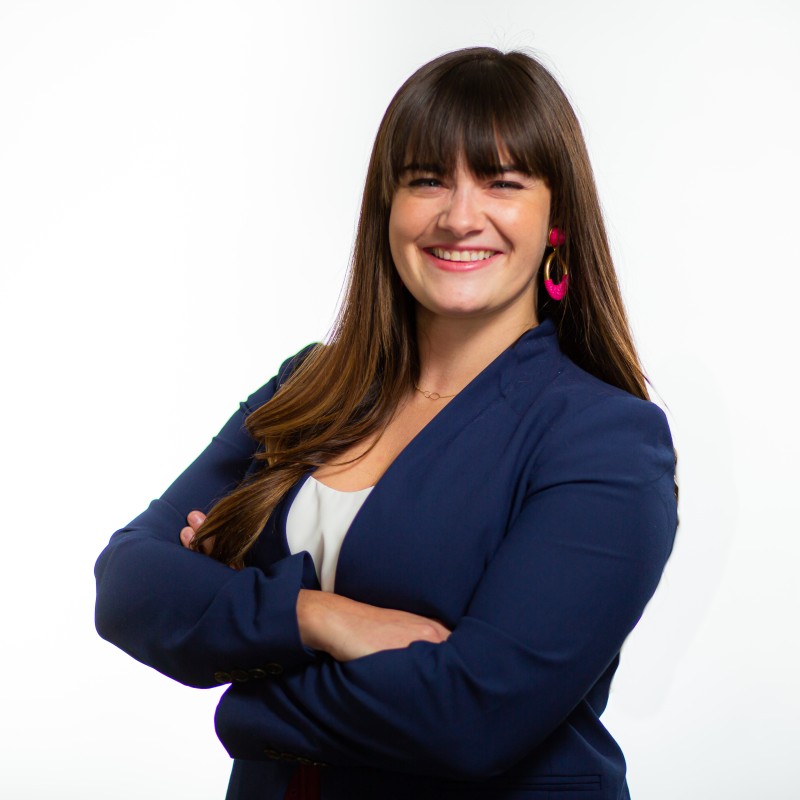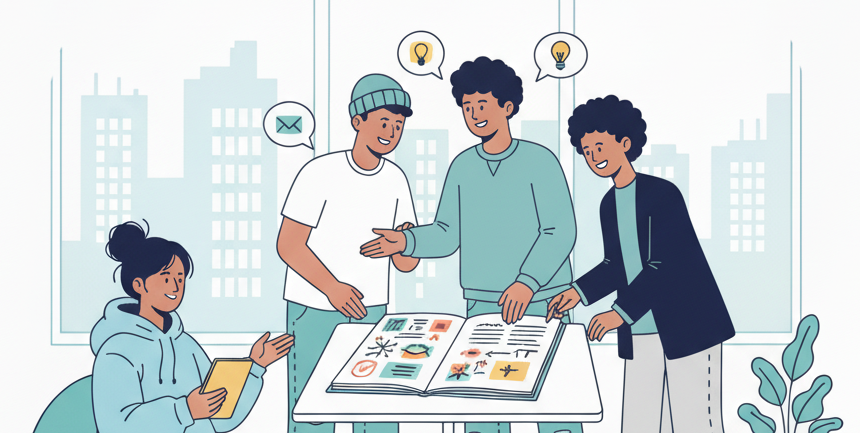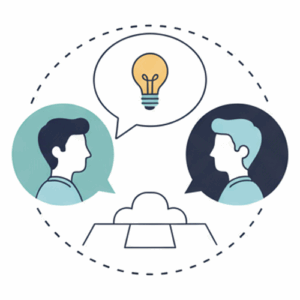Gen Z Is Ushering in the New Workplace Norms We All Want

As a partner and training provider to Orr Fellowship, ADVISA is pleased to share this perspective on Gen Z from Catherine Mazanek, Senior Director of Engagement, Orr Fellowship.
Who were you at 23?
Perhaps you were freshly graduated from college and working your first career position in the field you studied. Or perhaps you went straight into the workforce and had several years of work under your belt. What were you worried about then? What were your hopes and dreams for the future? Could you imagine yourself where you are today?
Now, envision that younger you going to school remotely during a global pandemic, entering an uncertain workforce without meeting your colleagues in person, and not knowing what the next day would hold, let alone the next year.
That’s Generation Z.
Launching a career at any age in any era can be difficult, but today, it’s also isolating. According to a recent survey by GWI, 80% of Gen Z respondents share that they have felt lonely in the past 12 months. Unfortunately, this isn’t only due to the pandemic. As the first digitally native generation, they have never been separated from technology or social media. These innovations have been both the driver of their social interactions but also the source of their loneliness. In addition, we have to factor in remote school and work during some of their most transformative years, adding to the sense of disconnect from others.
This influences where Gen Zers work and what they expect back from their workplace.

What Gen Z Wants
The oldest Gen Zers entered the workforce just before or during the pandemic, adapting with older generations as they found the “new normal.” However, to Gen Z, that normal isn’t new – it just is. They don’t have previous work experiences to compare to. What they do have are the countless articles and think-pieces written about the new state of work after COVID: the flexibility, the regular check-ins and feedback, the autonomy. There was intentionality behind these changes that would make everyone’s work lives better, but then those conversations were forgotten and many companies reverted to policies that look more like 2019 than 2022.
Gen Z has not forgotten those conversations. They saw the thought leadership articles defining what the new state of work should be, and they are forcing the rest of us to remember and revisit those conversations. To some, this can read as entitlement. To others, this can read as just having standards.
The challenge is drawing the throughline from what Gen Z is saying to what older generations want, because it is often the same thing. Gen Z says they want to work from home. Gen X wants to be able to leave the office early to attend their children’s soccer games. These are both examples of flexibility from which all employees can benefit.
Gen Z has certain expectations for workplaces, and if those expectations are not met, they will push back against the outdated management styles older generations are trying to force them to conform to. A common misconception is that Gen Z will do and say whatever they want and quit if they don’t get their way. In many ways, though, they’re just saying what everyone else is thinking.
So, what does Gen Z say they want, and how can workplaces adapt to keep Gen Z workers engaged for the long term?

1. Context and Community
By and large, Gen Zers are passionate and bring a lot to the table at a higher level than may be expected in their first roles. They are often high achievers who want to do well, but they have to care about what they’re working on. However, don’t expect them to care because you tell them they should. They need to understand their role within the bigger picture.
This is an effect of their digital connectedness and simultaneous isolation. They crave community. When managers are able to place their role in context with colleagues’ roles and how it impacts the business through to clients or customers, they see how they are connected to other people rather than margins or sales figures. They do their jobs well to help their fellow community members.
Make sure they understand their role within the bigger picture.
Community-building is a critical component of Orr Fellowship. We provide the community focus for Orr Fellows, which helps bring them into Indiana and retain them through the two-year program and beyond. Young professionals want to find belonging, and affinity groups, social events and continued educational programs can all contribute to building their community.

2. Structure and Flexibility
Another misconception about Gen Z is that they “reject structure and demand flexibility to do whatever they please.” In their first roles out of college, however, they probably don’t know what flexibility they actually want, need, or is reasonable from an employer’s perspective. Providing them with a structure, as well as context, gives them autonomy to make some decisions for themselves and gain managers’ trust.
Provide structure and context so they can make some decisions for themselves.
For example, if a manager tells a Gen Z employee they have to come to the office five days per week because that’s just how it is, they will find a new place to work. If, however, a manager says, “We’d like for you to work in the office three days of your choosing per week because you will be able to collaborate better with your coworkers on these projects,” that explanation will be met with more success and understanding. They know how many days they have to work in the office – structure – but they can choose which days – flexibility.

3. Clear Guidelines and Expectations
Much like being able to choose when and where they work, Gen Z wants some structure with room for autonomy, both in executing their job roles and in the workplace in general. They want to be told what they need to do, but not necessarily how to do it, and especially not because “it is the way it has always been done”.
In performing their jobs, they want to know what the outcome of their work is meant to be so they can work toward that goal. They do not want any unspoken expectations that they didn’t know would be counted toward their success or failure. For example, if you assign a project to an early-career employee with an end-of-day deadline, they will likely have it done at the end of the day. If what you meant was that you wanted it by 3 p.m. to review by the end of the day, you need to clearly make that distinction.
Tell them what they need to do, but not necessarily how to do it.
Gen Z often uses the term “transparency” to describe this, but a better descriptor is “expectation setting.” This is especially important to convey regarding professionalism in the workplace. Office norms have changed, and Gen Z doesn’t have a reference for pre-COVID office etiquette. What is normal and innately understood by older generations may never have occurred to Gen Z, such as needing to be at the office 10 minutes before a meeting starts, rather than arriving at the start time like they would when dialing into Zoom, because they need to set up AV equipment in the meeting room. They might opt to be off camera for video calls unless told otherwise about why it matters to show face. Set these clear guidelines and expectations, and then follow through by providing feedback in real time.
Final Thoughts
While these engagement ideas are geared toward Gen Z, they’re not for Gen Z alone. Millennials, Gen Xers and Baby Boomers alike can work better when they have flexibility, autonomy, clear expectations and regular feedback.
The workplace is different than it was before the pandemic, and probably radically so from when you first joined at 23 years old. As more of Gen Z joins the workforce while Baby Boomers retire in the coming years, companies will increasingly have to meet the younger generation’s needs if they wish to hire and retain young, driven employees who will carry the business into the future.
These engagement ideas are not for Gen Z alone. People can work better when they have flexibility, autonomy, clear expectations and regular feedback.
ABOUT ORR FELLOWSHIP
The Governor Bob Orr Indiana Entrepreneurial Fellowship (or “Orr Fellowship” for short) pairs bright, driven and versatile high-achieving recent college graduates with future-focused businesses across Central Indiana and Southwest Indiana.
Together, Orr Fellowship and its partner companies give graduates the professional development resources and support network they need to accelerate their careers. In addition to full-time employment with a partner company, Orr Fellows participate in a series of business leader speaker sessions, non-profit consulting projects, career coaching, personal finance workshops and pitch competitions.
Orr is a two-year commitment where two-thirds of Orr Fellows are retained at their partner company upon completion of the program. Many Fellows remain with their partner company as they progress in their careers or go on to graduate school.
If your organization is interested in becoming a partner company to invest in the future leaders of Indiana, you can learn more about what an Orr Fellowship partnership by visiting https://orrfellowship.org/become-an-orr-partner.
FUN FACT
ADVISA Leadership Development Specialist, Sarah Kolczak, is an Orr Fellow!
